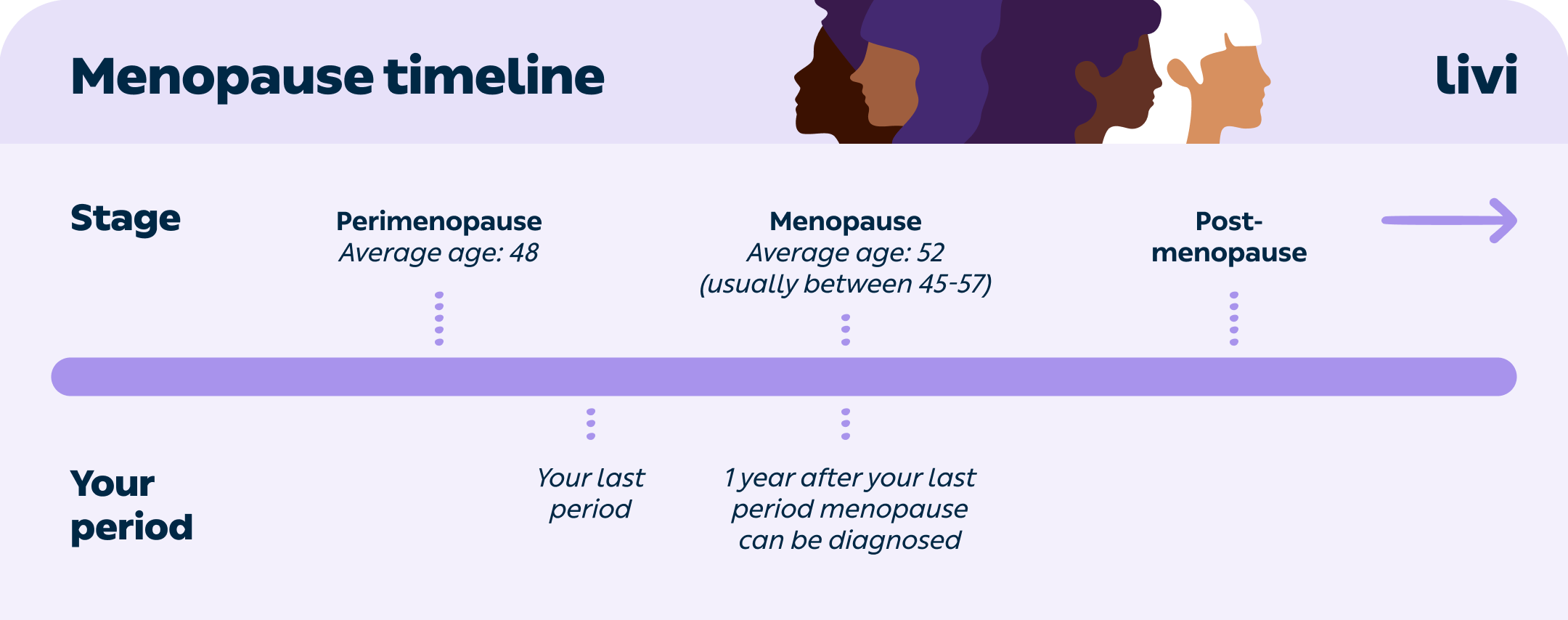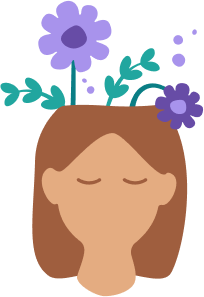Menopause is the time when your ovaries stop releasing eggs and you stop having periods. The experience is different for everyone, and it’s usually a gradual change that happens over a few years, giving you time to adapt and seek support for symptoms along the way.

What’s perimenopause and how do I know it’s happening?
Perimenopause is the time period leading up to menopause. ‘The first sign is usually a change to your menstrual cycle,’ says Dr Elisabeth Rosén, a Livi doctor who specialises in gynaecology and obstetrics. ‘Usually, your menstrual cycle starts to shorten, then it becomes more irregular, often with heavier, longer bleeds.’
Perimenopause happens when your ovaries begin to stop working. They start making fewer and lower quality eggs and follicles (sacs filled with fluid that hold an egg).
Changes to your menstrual cycle
‘Your cycle becomes shorter because the amount of progesterone you produce decreases, which makes the lining of your uterus shed sooner,’ explains Dr Rosén. ‘Eventually, the few eggs that remain struggle to mature every month, but your body keeps making hormones to regulate your ovaries, leading to irregular and longer bleeds.’
Hormonal changes
As your body produces lower levels of oestrogen and progesterone, it can trigger a range of perimenopause signs and symptoms like hot flushes and vaginal dryness.
‘Most people experience some mental and physical difficulties throughout this transition. Some only notice them for a year or so, while others can have symptoms for 10 years or more,’ says Dr Rosén.
Key perimenopausal symptoms
If you’re perimenopausal, you may experience some or all of the following symptoms:
- Vaginal dryness
- Urinary incontinence
- Recurrent urinary tract infections (UTIs)
- Vaginal bacterial infections
- Hot flushes
- Decreased quality of sleep
- Low mood, depression or panic attacks
- Weight gain
What age does perimenopause usually start?
The average age that perimenopause starts is 47.5 years , but it varies depending on ethnicity, genetics and lifestyle factors. Perimenopause lasts an average of 4 years and ends with your final menstrual period.
What is menopause?
Menopause is the time between perimenopause and post-menopause. ‘You’re considered to have reached menopause when it’s been a full year since your last period,’ says Dr Rosén.
‘When your ovaries’ function is so compromised that your hormone levels are no longer enough to build up the lining of your uterus, your periods stop.’
What signals the end of menopause?
Your oestrogen production will continue to decrease for a few years after you reach menopause. Around 5 years after your last period, the levels of oestrogen in your body have reached a constant, very low level, marking the end of menopause and the beginning of post-menopause.
‘You remain post-menopausal for the rest of your life,’ explains Dr Rosén. ‘At this point, a lot of the symptoms of menopause will disappear. Your body learns to regulate its temperature and the hot flushes go away. Most people also feel that their moods stabilise.’
Some changes may remain, like vaginal dryness. ‘This can be painful and itchy, and may make having sex difficult,’ says Dr Rosén. If this is a problem for you, speak to a doctor.
What’s the average menopause age?
The average age of menopause is 51, but anything from the age of 40 to 57 can be normal.
There are a number of factors that can influence when you reach menopause, including:
- The age your mother reached menopause
- Lifestyle habits
- Blood pressure
- BMI
- Sun exposure
There’s also strong evidence that smoking is linked with earlier menopause. ‘Very intense physical activity, a diet high in polyunsaturated fats and high blood pressure are also associated with an earlier menopause age,’ explains Dr Rosén.
Pregnancy and breastfeeding may cause later menopause, most likely because they prevent you from ovulating and depleting your supply of eggs.
What’s considered early menopause?
Early menopause is menopause that begins before the age of 45. This happens in around 5% of women. Around 1% enter menopause before the age of 40, which is called premature ovarian insufficiency (POI).
‘See a doctor if your periods start to get irregular before the age of 40 or they stop completely before the age of 45,’ says Dr Rosén. ‘The symptoms of early menopause, perimenopause and menopause later in life are the same, but for some they can be more pronounced as hormone levels decrease very rapidly.’
The exact cause of POI is often unknown, but it can be genetic or linked to auto-immune conditions like hypothyroidism. ‘It can also be triggered by medical treatments, including cancer treatment such as radiation and chemotherapy,’ says Dr Rosén.
Do I need to see a doctor about early menopause?
Usually, blood tests aren’t needed to diagnose menopause. But if you’re young, a doctor might want to check your levels of the hormones FSH and LH to help diagnose POI early.
Oestrogen also protects against heart disease. ‘If you have POI, you might need hormone replacement therapy (HRT) to prevent osteoporosis and lower your risk of heart disease,’ says Dr Rosén. ‘Calcium and vitamin D supplements can help support your bones, too.’
Coming to terms with the fact that you’re no longer fertile can be challenging regardless of your age, but it can be especially difficult if you’re going through early menopause. ‘See your doctor for advice,’ encourages Dr Rosén. ‘Getting answers and understanding what’s happening to your body can be enough, but you might benefit from CBT or another type of talking therapy.’
When should I see a doctor about menopause symptoms?
It’s perfectly OK to make an appointment with your doctor about your symptoms during menopause. ‘If you’re not feeling well, getting reassurance can really help,’ says Dr Rosén.
Everyone’s experience with menopause is different. If you’re struggling to cope, hormonal treatments like HRT or local oestrogen can be used to treat symptoms like hot flushes that are caused by low levels of oestrogen.
‘HRT is very safe if it’s started before the age of 60 and not given for more than 5 years. It can also lower your risk of heart disease. For some, it also helps a lot with psychological symptoms,’ says Dr Rosén.
It’s also best to speak to a doctor if:
- You’re suffering from vaginal dryness
- You have a period more often than every 3 weeks
- You have very heavy periods or spotting between periods
- You have any bleeding at all after menopause
- You’re struggling with any menopause-related symptoms
This article has been medically approved by Dr Elisabeth Rosén, a Livi doctor who specialises in gynaecology and obstetrics.


